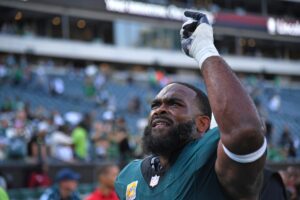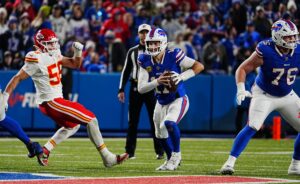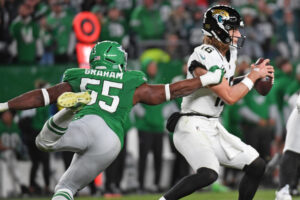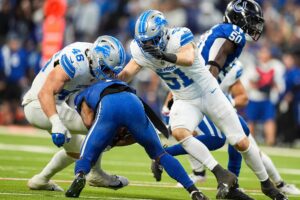No matter how much cap magic Chicago Bears general manager Ryan Pace works, he can’t make the criticism disappear. Details about the contracts of their free-agent class have are in and they should definitely take the sting out after the group got widely panned. But Pace has always done well in that regard. And even that isn’t as special as one might think.
Cap Magic Can’t Make Criticism of Ryan Pace Disappear
Pace’s Principal Problems
Chicago’s six-man free-agent class was called one of the worst of the period. They were surprisingly aggressive (perhaps a sign of what to expect come draft time) and spent big money on EDGE Robert Quinn to finally give Khalil Mack a proper running mate. The signing (for five years and $70 million with $30 million guaranteed) received the warmest reception.
They released former first-round bust Leonard Floyd and made a clear upgrade. But Quinn (who has played for the Los Angeles Rams, Miami Dolphins, and Dallas Cowboys) isn’t great against the run and will be 30 by the time the season starts. Five years is a long commitment. Except the deal has a potential out after two years with less than $10 million in dead money.
Jimmy Graham was the other aggressive and surprising signing by Chicago. But this one was far less understood by the masses. Graham, 33, hasn’t been the weapon he used to be for two years but still outproduced all six of the tight ends for the Bears combined. Two years and $17 million is steep but it too has an out. If triggered, Chicago is just in the hole for $9 million in 2020.
This is what Pace does though. People still talk about the Mike Glennon deal from 2017 as being horrible but he was gone the following season. They needed a quarterback, he was widely viewed as the best available at the time, and they didn’t suffer any long-term ramifications. Yet all critics focus on is the initial investment.
In the Nick of Time
When the Bears traded for Nick Foles, many (present company included), panned him for giving up a fourth-round pick in addition to taking on the remaining money on a rather large contract. The Jacksonville Jaguars had been rumored to be talking a fifth-rounder as compensation in a potential deal with the Indianapolis Colts.
Well, once again the details have come in and they make the trade look better for the Bears, at least a little. A restructure, that was apparently a major sticking point on Pace and the Bears end, means that Foles will essentially make $8 million per season. He also has an out after 2020 should he outperform his deal.
This one is a bit tricky to judge. The restructuring made the contract look a lot better but also presents an interesting potential roadblock. If Foles hits all his accelerators and then opts out, he will then be up for another big contract. The Bears would almost certainly have to pony up, but the risk in giving Foles a lot of money shouldn’t need to be explained.
Then there’s Mitchell Trubusky. The incumbent starter has seen his situation deteriorate from having the apparent full support of management to having that same group say there is an open competition for the job. If he doesn’t win the job, how does Chicago keep him around? His contract is up after the season and the Bears don’t have any incentive to pick up his option.
Pace Needs Wins, Not Cap Magic
Love or hate the move made by the Bears, it is important to realize that it won’t matter. And that’s whether they win or lose. If the Bears win, nobody will care what they trade for Foles or how much they guaranteed to Graham. No one will give a rip about Quinn’s run defense if he helps them hoist the Lombardi trophy. If they don’t win, though, there’s likely to be a regime change.
That’s what it’s all about; winning. Chicago is 34-46 in five seasons under Pace’s direction. They are running out of people to put the blame on for the failings on the field. They have moved on from underperforming players and coaches. But at some point, the person hiring those coaches and paying those players has to take responsibility. One way or another, he will after next season.
Main Photo:
Embed from Getty Images






